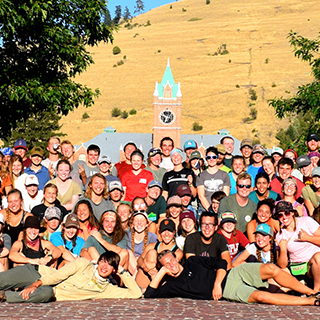Safety Management
Safety Management
Safety Management and Essential Eligibility Criteria
Outdoor Program and Wilderness Institute – Freshman Wilderness Experience
Essential Eligibility Criteria
The following outlines the essential eligibility criteria for minimum physical and mental functions to participate in Outdoor Recreation Program programing. All program participants must be able to do the following with or without reasonable assistance.
*Reasonable assistance is defined as aid, the use of technology, alterations to an itinerary, and/or other programmatic support that allows for the achievement of stated outcomes.
General
- Stay alert and focus attention for up to several hours at a time while traveling in wilderness terrain, attending classes, and receiving instructions.
- Respond appropriately to stress or crisis when encountering hazards, severe weather, or a medical emergency.
- Maintain proper medication dosage, if taking prescription medications, by self-medicating without assistance from instructors or others (except in emergency situations).
- Identify and recognize hazards and risks posed by other course members, which include, but are not limited to, fatigue, state of mind, and actions that may influence judgment and decision-making.
- Recall and understand hazards and risks previously explained by instructors
- Identify, recognize, and respond to instructions regarding environmental hazards – including falling objects, loose rock and unstable surfaces, rugged, steep and uneven terrain, mountains, desert, cliff edges, moving water (fast or slow) such as rivers, creeks, and potentially hazardous animals and insects.
- Act responsibly around hazards to minimize risk even when not directly supervised.
- The ability to breathe without the use of electronic medical devices that cannot be maintained in remote environments.
- Manage personal care independently or with assistance in remote environments without access to electricity and/or running water
- Manage personal mobility over uneven and rocky terrain with or without reasonable assistance
- Follow instructions and effectively communicate independently or with assistance of a companion
- Ability to communicate with program participants and staff during stable and unstable environmental conditions
- Maintain a safe body position while participating in program activities as outlined in individual trip/program materials
- Ability to manage stress, participate in group activities, and quickly adapt to rapidly changing environmental conditions
Watercraft-based programming
- Independently maintain sealed airway passages while under water
- Independently turn from face-down to face-up and remain floating face up while wearing a properly fitted life jacket
- Get on/off or in/out of a watercraft independently or with a reasonable amount of assistance
- Independently get out and from under a capsized watercraft
- Remount or re-enter the watercraft following deep water capsize independently or with a reasonable amount of assistance
- Be able to swim or be comfortable in the water, including fast moving water, while wearing a personal flotation device (PFD).
Backpacking
- Travel over terrain that is rugged, steep, and/or off camber independently or with reasonable assistance
- Transport necessary equipment for distances of up to 1 mile at a time independently or with reasonable assistance
Safety Management
All outdoor activities, by their nature, involve inherent risks. One of our goals is reducing the risk of injury and illness; doing so involves engagement and commitment on the part of participants as well as good judgment and leadership on the part of our trip leaders.
Our FWE trips are led by University of Montana students who have experience both in wilderness first aid and in leading groups outdoors. Our leaders go through a spring training program to become eligible to lead FWE trips. Planning is done to ensure that we are hosting trips that are inclusive of UM’s diverse student body and we welcome student feedback.
Using the participant Medical Form to fully and honestly disclose previous and ongoing medical concerns, including physical, mental and behavioral health is an important component to reducing risk on our trips. Disability related accommodations can be made for trips and we encourage you to contact the Office for Disability Equity to discuss possible accommodations if needed.
Given that the FWE trips are led by students, the FWE professional staff reserves the right to determine applicants’ suitability for trips based on medical and behavioral history, our capacity to manage medical situations as they arise, and our trip leaders’ experience and medical training. Please note the majority of trip leaders are certified at the Wilderness First Aid level, with every attempt made to have at least one leader per pair certified as a Wilderness First Responder. Our trip leaders are not medical professionals. Trip leaders will make decisions regarding evacuations for life-threatening and non-life-threatening situations in accordance with their training and ability to contact program supports.
If evacuation is indicated for a non-emergent situation, the finances and logistical considerations will be the responsibility of the participant.
If you have more general questions, please visit our FAQ page.
